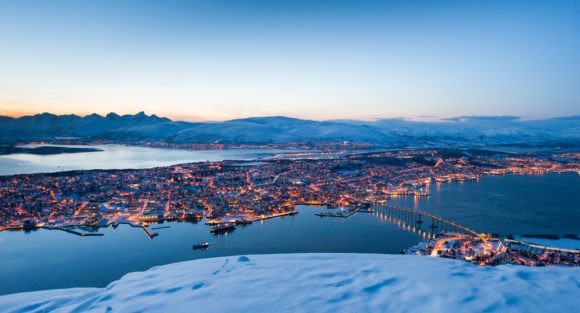
In Oulu Smart City Seminar, we had the opportunity to meet three northern Scandinavian Mayors: Mayor of Luleå (Sweden), Mayor of Tromsø (Norway) and Mayor of Oulu (Finland), who have been building up a cooperation network in the Arctic area. Between these three hubs, there’s nowadays more exchange of knowledge and ideas – and also traffic – since flight connections from Oulu to both Luleå and Tromsø were started last summer.
Based on the topic of the seminar, smart cities, we had a discussion with the Mayors about what makes their cities smart. We were also eager to know how the leaders see the role of startups in developing these three cities. So what is a smart city?
“A smart city is something that makes the life of its citizens easier,” says Yvonne Stålnacke, The Mayor of Luleå. “Luleå as a smart city that is getting even smarter,” she continues. Stålnacke points out that for an arctic city, the most important thing is to make the most out of the resources they have – knowledge that comes from the region and the natural resources – in developing the city.
“We have a lot of water (and ice), and that’s what some businesses need. Because of our natural resources, we got the Facebook data centre in Luleå,” Stålnacke says.
The Mayor of Tromso, Jens-Johan Hjort, nods while listening to Stålnacke and adds that smart city listens to its citizens: “We could be smarter, and public sector could use innovation and technology better. It’s best for the city to be in the frontline of development.”
Smart cities are open
All Mayors agree that the solutions for developing smarter cities doesn’t come by staying at home – the inspiration comes from cooperation. They emphasize both role of cooperation in the Nordics and also inside the cities.
“Smart city starts from the people and the companies, and we need to develop services that make their living and working easier in the region,” says Pennanen: “Especially in Oulu’s case, the perspective has to change from tech towards service-based thinking. Adapting a customer-oriented perspective in all levels and being humble is the key.”
Being open in the global scale is also essential in learning from other cities, because it makes no point trying to create everything from scratch. Hjort points out getting to know places where the buzz of a smart city is already ongoing is essential for city leads in adapting better services also to arctic municipalities. “The solutions can be found from the world,” says Hjort.
“I traveled last year to Google seminar in Silicon Valley in an international group, where I was the only politician. As all the other participants were eager to tell my story to their city leads, my welcoming back to Norway wasn’t that positive after the trip. I went to there to search for new ideas that we could use in developing our city, and I was so surprised when I got back home – I was in the front page of magazines with headlines telling that I went for a holiday trip to California,” Hjort continues. “Nobody asked me what was the purpose of the trip. Developing smart cities requires also a change in the attitude of the public.”
Changing knowledge
All city leaders also point out the importance of University cooperation between the three cities. All cities have strong and well-known universities, that are thriving for development together.
But how can startups and new business be integrated in developing new services to cities? The Mayors admit that there hasn’t been that much cooperation done with startups yet, but they see a great potential in it. Right now they find it important that city data is provided in open platforms, so that new innovative services could be developed also outside the public sector.
“We have a lot of creative gatherings and also a co-working space in Tromso. The University and firms are starting new businesses – and hopefully there will be more cooperation between these two in the future,” Hjort says.
The meaning of startups is found critical in developing new business in the arctic region – There’s services needed to be developed only for cold regions and also health care sector seems to need new innovations in the area while the age structure of the cities will radically change during the next decades. All cities have good ecosystems for developing new businesses according to the Mayors and startups are recognized to be the key players in creating new products and services.
The main point of our discussion was that these Nordic city leads believe in the innovative people in their cities. “We don’t need to go to bigger cities like Helsinki or Brussels – We can create something really unique here up north,” says Pennanen.
The Mayors drive now to develop smarter cities especially with other Nordic cities, how would we get the public sector connecting with the startups?




